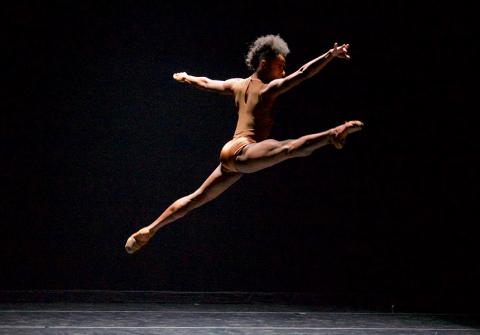'Dance Magazine' Spotlights Boston Conservatory's Innovative Work on Inclusivity in the Classroom

Boston Conservatory at Berklee recently announced that select courses in its ballet curriculum will be renamed in support of an ongoing institutional effort to ensure inclusivity in the classroom. A bold first step in creating dialogue around gender constructs in traditional dance forms such as ballet, Executive Director Cathy Young sat down with Dance Magazine to talk about Boston Conservatory’s focus on inclusivity and how its Dance Division curriculum—and the renaming of these courses—reflect this. Read the full article below, or at DanceMagazine.com.
From DanceMagazine.com:
Is It Time to Rethink “Men’s” Class?
By Jennifer Stahl, Dance Magazine
Next semester, there'll be a new course name on the syllabus of Boston Conservatory at Berklee: "Constructed Gender Identities in Classical Ballet: Men's Variations."
But this is not a new course, just a new title. The old name is one you might recognize: "Men's Class."
The official course names for both Women's Variations and Pas de Deux will also start with the qualifier "Constructed Gender Identities in Classical Ballet." What does this mean? Well, for starters, it means that all three classes will be open to any dance student who wants to take them, regardless of their gender identity.
"As a higher education institution, we do not want to be offering a course that's only available to certain students based on their gender identity," says Cathy Young, the executive director of Boston Conservatory at Berklee and former dean of the Dance Division. "We want all of our students to be able to access all the material that's being offered."
Even though the dance division has previously had male-identifying students take pointe class and female-identifying students take men's variations, it is now official school policy that these classes must be open and inclusive to all.
In addition to increasing access, this change is also designed to help present ballet in its historical context. "Classical ballet is built around a particular presentation of gender that reflects a specific moment in time," Young explains. "This is not about making a judgement about that, but contextualizing it."
She admits that she's a bit apprehensive about how some in the ballet world—possibly including Boston Conservatory's own faculty members—might interpret this shift. So she's very clear: "This is not at all about dismantling ballet traditions, or devaluing traditions. It's about reframing how we present this material to our students, so that everyone can engage with this form."
These changes came at the urging of the student government association. But the school's leadership has been having several conversations about gender for the past two years, ever since then-sophomore Lilly Rose Valore announced that she identified as female and asked for access to parts of the ballet curriculum recommended for female-identifying students. Ever since transitioning, Valore has worked actively to make the school a more inclusive and accepting space. Today, the Conservatory also has students who identify as non-binary.
"Labeling your curriculum around gender identity, you're excluding students—that seems deeply unacceptable to me," says Young. "Our job as a conservatory is to respect the traditions but also reimagine them so they are relevant to the world we live in now." She also wants to make sure the school is nurturing every student. "In terms of training them as performing artists, the center of what we do is helping them develop their unique, individual voice. We want to make space for all of those voices."
Boston Conservatory at Berklee’s contemporary dance program is widely considered the best in the U.S., and consistently ranks as a “top 10” school for dance. Learn more about the Conservatory’s dance degree program, and watch what current students are creating.
